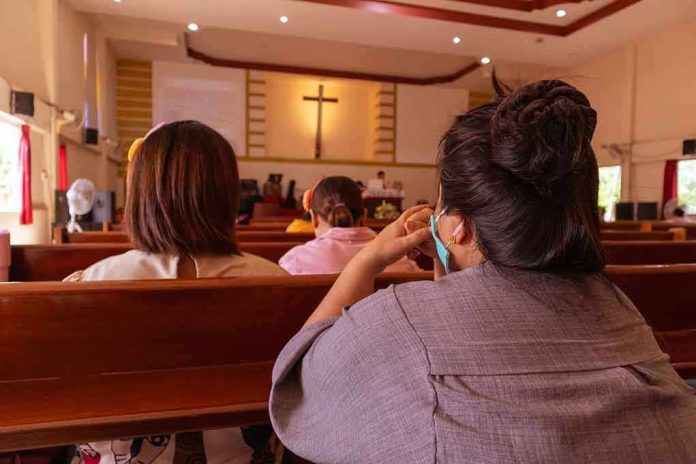
FBI data reveals a shocking 100% increase in attacks on religious centers since 2021, as the Justice Department ramps up its response to what officials are now calling a form of domestic terrorism.
Key Takeaways
- Attacks on religious facilities have doubled from 2021 to 2023, according to FBI data, prompting increased federal prosecution and security measures
- The Justice Department recently closed an investigation into a Muslim-centered community near Dallas after confirming the development complies with the Fair Housing Act
- Religious institutions across America are implementing heightened security measures, including armed guards and alarm systems
- Many attacks are linked to white nationalist ideologies targeting minority and LGBTQ-friendly religious communities
- Recent prosecutions include 25-year sentences for individuals planning attacks on religious centers
Rising Tide of Religious Violence Prompts Federal Response
The Justice Department has taken decisive action against perpetrators of religious violence as attacks on houses of worship reach alarming levels across the nation. FBI statistics paint a disturbing picture: assaults on religious institutions have increased by nearly 100% from 2021 to 2023. This surge has prompted federal authorities to prioritize the prosecution of these cases, with recent convictions yielding significant prison terms. The pattern of violence has left religious communities in a state of heightened vigilance, with many implementing security measures that would have seemed unthinkable just years ago.
“I think it’s a form of terrorism, because attacks on churches are meant to terrorize people. And they’re meant to deter people from going there. And so it makes everyone feel unsafe,” said Harmeet Dhillon, Assistant Attorney General for Civil Rights.
Recent federal prosecutions highlight the severity of the government’s response. Rui Zhang received a 25-year sentence for planning an attack on a Virginia church, while Zimnako Saleh was convicted for targeting churches across multiple states. Kevin Colantonio pleaded guilty to setting fires at a predominantly black church, and Elias Rodriguez faces charges for murdering Israeli embassy officials. These cases represent just a fraction of the violence directed at religious centers nationwide, but they demonstrate the President Trump’s administration’s commitment to protecting religious freedom.
Muslim Community Development Cleared After Federal Investigation
In a related development, the Justice Department recently closed its civil rights investigation into EPIC City, a Muslim-centered planned community near Dallas, without filing charges. The investigation began after U.S. Senator John Cornyn raised concerns about potential discrimination against Christians and Jews. The project, linked to the East Plano Islamic Center, has faced multiple investigations from state officials, including claims it would impose Islamic law. However, federal authorities determined the development complies with fair housing regulations.
“The false accusations that have been swirling around the development were based solely on misinformation, lies, and false rumors,” said Dan Cogdell, an attorney for EPIC City.
The conclusion of the investigation represents a victory for Community Capital Partners, the project’s developers, who have maintained that their planned community, which includes over 1,000 homes, a faith-based school, a community college, and assisted living facilities, will be open to people of all faiths. The developers have agreed to revise marketing materials to emphasize inclusivity. The project had become entangled in political tensions, with Attorney General Ken Paxton, who is challenging Cornyn for his Senate seat in 2026, among its most vocal critics.
The Human Cost of Religious Violence
Beyond statistics and prosecutions lies the profound human impact of these attacks. The 2018 shooting at Pittsburgh’s Tree of Life synagogue, which claimed 11 lives, represents one of the most devastating examples of religious violence in recent American history. The emotional wounds remain fresh for survivors like Alan Hausman, president of the synagogue’s board. Religious institutions across Pittsburgh have responded by implementing comprehensive security protocols, including armed guards and sophisticated alarm systems, fundamentally changing how congregations worship.
“Every time I see another attack, it’s like someone picked the scab off of my wound,” said Alan Hausman, president of the Tree of Life synagogue board.
The Southern Poverty Law Center reports that many attacks are driven by white nationalist ideologies and specifically target minority communities and congregations that support LGBTQ individuals. Synagogues in particular have experienced increased vandalism and harassment, especially following events in Israel. The Justice Department has emphasized that protecting religious freedom remains a cornerstone of American values and has committed to swift legal action against perpetrators. The administration’s approach combines aggressive prosecution with community outreach to ensure religious centers can fulfill their vital social roles without fear of violence.
Government’s Renewed Commitment to Religious Freedom
Assistant Attorney General Harmeet Dhillon has emphasized the Justice Department’s commitment to ensuring religious institutions aren’t perceived as “soft targets” for violence. The strategy involves prosecuting offenders to the fullest extent of the law while working with religious communities to enhance their security preparedness. This approach recognizes that religious institutions serve as essential community hubs that provide not only spiritual guidance but also critical social services. Law enforcement agencies are increasingly sharing intelligence and resources to monitor threats against religious centers.
“We want to shut that threat down by making sure that no one feels like churches, houses of worship, or people of faith are soft targets in the United States. That is why it’s a priority,” said Harmeet Dhillon, Assistant Attorney General for Civil Rights.
For religious leaders and their congregations, the balancing act between maintaining openness and ensuring security presents an ongoing challenge. Many have reluctantly accepted that visible security measures are now necessary components of religious life in America. Despite these challenges, religious communities continue to affirm their commitment to serving as beacons of hope and gathering places for their members. The federal government’s vigorous response to religious violence signals a recognition that attacks on houses of worship represent attacks on fundamental American values of religious liberty and peaceful assembly.




